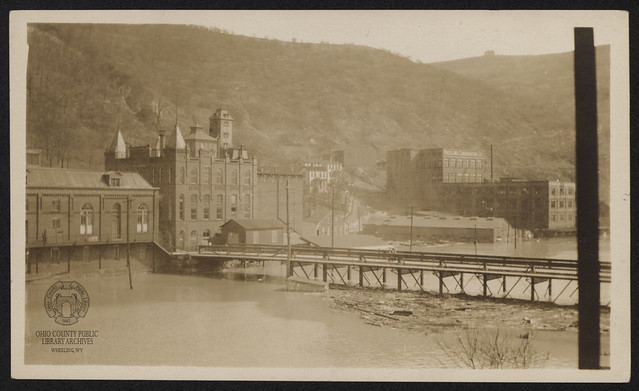Manchester Bridge in Wheeling
According to an Intelligencer article written by Martha Leonard in 1989, "little written history about the bridge exists."
"A bridge at this site may have been in existence as early as the 1860s, where Peter Paul Bec, founder of Reymann's Brewery, had buildings on the east side of Wheeling Creek. Reymann's was regarded as one of the foremost breweries in Wheeling in the late 1800s, and if the brewery was not the primary reason the bridge was built, its employees certainly were the main users of it.
"In fact, Beck may have been Wheeling's first beer brewer. According to the 'History of the Panhandle,' written in 1879, no one really knows who the first brewer was, but Beck was at least among the first. 'We cannot with any degree of certainty, venture an opinion as to who brewed the first ale in this section, but we believe we are not far out of the way in saying Mr. P. P. Beck, founder of the Reymann's brewery, was the first beer brewer here, and Mr. Louis Keller was the pioneer saloonist who dispensed it at retail, in a humble premises, located at the southern end of the creek bridge.'
"Later documentation disputes Beck as being the first brewer, but historians agree that he was at least one of the most popular.
"Presumably the 'creek bridge' referred to was the predecessor to the bridge we now know as the Manchester Bridge."
On June 4, 1889, a written agreement was drawn up between the City of Wheeling and the Wheeling and Harrisburg Railway Company of West Virginia to outline the specifications of the proposed replacement of the "creek bridge."
At a cost of $16,500, "two abutments and one pier on each side of Wheeling Creek ... which shall be two spans of fifty feet each and one span of one hundred and eighty-four feet, the "17th Street Highway Bridge" was built. The bridge opened November 1, 1889. The original deck was built out of three-inch oak planks. By the 1950s, the deck had been replaced with concrete flooring.
Because of structural damage, load limits on what came to be known as the Manchester Bridge were reduced from 20 tons to 5 tons in 1978 and again from 5 tons to 3 tons in 1980. The bridge was closed to traffic in the early 1990s and razed in 1996.
Location
Traveling south on Rock Point Road, you would have Crossed the Manchester Bridge over Big Wheeling Creek to connect 17th street in Wheeling to Rock Point Road in the Manchester section of Wheeling near the area where the Reymann Brewing Co. factory used to be.
Images

Newspaper Articles
▶ No newspaper articles at this time
Additional Resources
▶ Vertical File: Manchester Bridge, Wheeling Room, non-circulating, ask for access at the reference desk.

